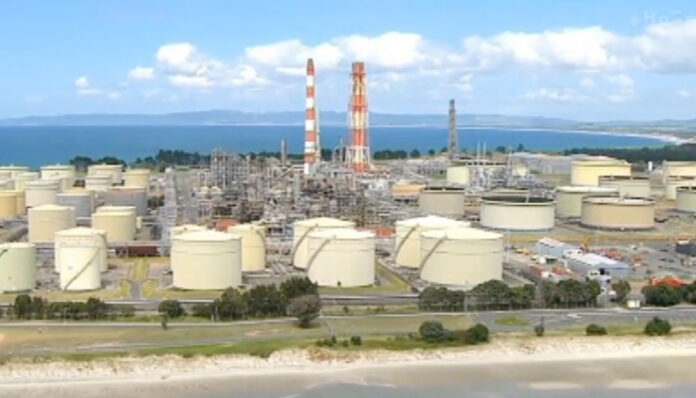The petition started by Social Credit is calling on the government to take action to keep the Marsden Point Oil Refinery operating has topped five thousand signatures in just four days.
The petition calls on the government to declare the refinery a nationally strategic asset, to compulsorily purchase all the shares from the private owners, and turn it back into a state owned enterprise which continues to refine the fuels needed to keep the New Zealand economy operating.
The petition has got over 5200 signatures already and is here.
In the event of a natural disaster or a geopolitical conflict the shipping routes to New Zealand could be cut off and the supply of fuel to major sectors of the New Zealand economy severely compromised.
Simon Terry of the Sustainability Council, Adelaide energy analyst Dr Graeme Bethune, and head of the Northern Australia Strategic Policy Centre Dr John Coyne have all made it very clear that relying on assumptions that global supply chains could readily deliver is strategically naïve.
For fuel security to keep all major essential transport, freight, air and defence operations going New Zealand needs to be able to refine its own oil as reliance on overseas refined product getting into the country is fraught with danger.
New Zealand needs to ensure that essential services could still operate.
This list is not exhaustive but includes:-
– Air transport into and out of and around New Zealand including all our air freight exports
– Helicopter rescue services
– Coastal shipping, inter-island ferries and shipping to the Pacific Islands
– New Zealand’s Army, Navy and Air Force including rescue and disaster relief operations
– Commercial fishing boats and short distance ferries
– The country’s trucking fleet that moves goods around New Zealand
– Heavy construction machinery and infrastructure and road building equipment
– Agricultural machinery including forestry, farming and horticultural equipment
– Goods and passenger rail operations
Government ownership of the refinery would also be the opportunity to break the stranglehold the oil companies have on fuel retailing.
The refinery could become a wholesaler of fuel selling at a common price, allowing smaller retail operators to enter the market and provide real competition in fuel retailing.
Approximately 600 jobs will be lost if the refining operation shuts down with many of those people being forced to look for jobs overseas with the consequent loss of yet more expertise and knowledge to New Zealand.
The purchase of the refinery could be achieved at no cost to taxpayers, using to capacity of the Reserve Bank which has already created around $60 billion in the last 18 months.
A Labour government has used that capacity in the past and this one needs to stop sitting on the sidelines wringing its hands and act in the interests of New Zealanders.
Chris Leitch is the Leader of Social Credit






Hey Chris, it’s a no brainer to keep that refinery.
But but but…but what about the poor Greens? This will upset them. Mind you, they already upset all of us by forcing dirty coal into the country when we have good coal right here to be mined, creating jobs in the process.
Signed!
The blind stupidity of privatizing an asset so vital for national security. Was that the work of Lange-Douglas or Bolger-Richardson?
This, from Wikipedia, answers your question:
Following the election of the reformist Fourth Labour Government in 1984, the Petroleum Sector Reform Act was introduced. This Act deregulated the petroleum industry, with 1,500 workers expected to lose their jobs. The Refinery assets were transferred by the Government to the New Zealand Refining Company Limited, a consortium of the five major petrol retailers. BP, Mobil and Z Energy are currently major shareholders.[2] The Government injected $80 million to enable the company to adapt to the new environment.
It would seem that we have learned nothing from the folly of shutting down all (or most) of the timber mills around the country and shipping our logs off shore to he milled in the hope that they will deem us worthy of selling our own wood back to us all cut up and pretty. Look how that’s working out at the moment… Enough i say. You can’t continue to make the same mistakes over and over and retain any credibility… If fact its the definition of insane.
Really hoping to see some Social Credit representation in the next Parliament.
People are waking up to the possibilities offered by your policies Chris, especially when they look at what’s on offer from the other (significant) political options few of which, if any, truly represent the people’s best interests.
Chris, can you clarify something: You rightly argue: “In the event of a natural disaster or a geopolitical conflict the shipping routes to New Zealand could be cut off and the supply of fuel to major sectors of the New Zealand economy severely compromised”. But wont the supply of crude similarly be cut of by the same circumstances leaving the refinery with nothing to refine.
We have enough NZ produced crude to meet 20% ( so hospitals police cars for example)and it needs less refining than Saudi Crude. Hope that helps.
So little information has been released to the public so there is a lot of misunderstanding. The Refinery is vital to any energy transition. Retain the skills base and repurpose the site. ( sits on IWI owned land by the way) We will still be liable for any emissions from those refineries who supply refined fuel. The government is being lead by the nose by China( NZ bureaucrats who are totally biased) and lazy greedy energy companies.
Is my memory deceiving me, or do I recall that the refinery cannot handle the crude oil NZ produces, and can treat only imported crude anyway?
That does not help self-sufficiency in any way at all, if my memory is correct.
NZ exports what little crude it can extract because it is of quite high quality and fetches a better price than high-sulphur, low-grade oil.
NZ then IMPORTS high-sulphur, low-grade crude.
There has been an increasing tendency for NZ to import fully-refined petroleum products because it is deemed better use of resources to use NZ to produce dairy products and sell them overseas acquire funds to buy fuel etc. And this strategy keeps some of the pollution associated with refining overseas.
Needless to say, the world is an interconnected system, and pollution generated here and overseas eventually ends up distributed all around the world.
Carbon dioxide.
Methane.
Dioxins.
Plastics.
Microplastics.
Fluoride compounds (from aluminium smelting).
Mercury released by burning coal.
Leaking radioactive isotopes from the Fukushima explosion.
Etcetera. Etcetera.
They all end up everywhere (including in human bloodstreams), commencing with higher concentrations at the point of generation.
Yes it can handle NZ crude it’s just that other oil companies pay large sums for it because it is very pure oil.
The decision to stop mass refining was made 2+ years ago. This petition is well late! Also I doubt the petition states the hundreds-of-millions required in subsidies/upgrades to make such a proposal viable.
How about a petition to restart fossil-fuel exploration?
I won’t be signing this too-little too-late petition.
Yep, Zack, I’ll sign your exploration petition any day. We have to make our way in the world and stop our stupid NIMBYism. We need to earn heaps of money, simple as that. The Leftists think a CGT on houses will sort all our problems. Look at Norway and Denmark, very rich countries with similar populations. Denmark has 55 oil platforms.
Comments are closed.